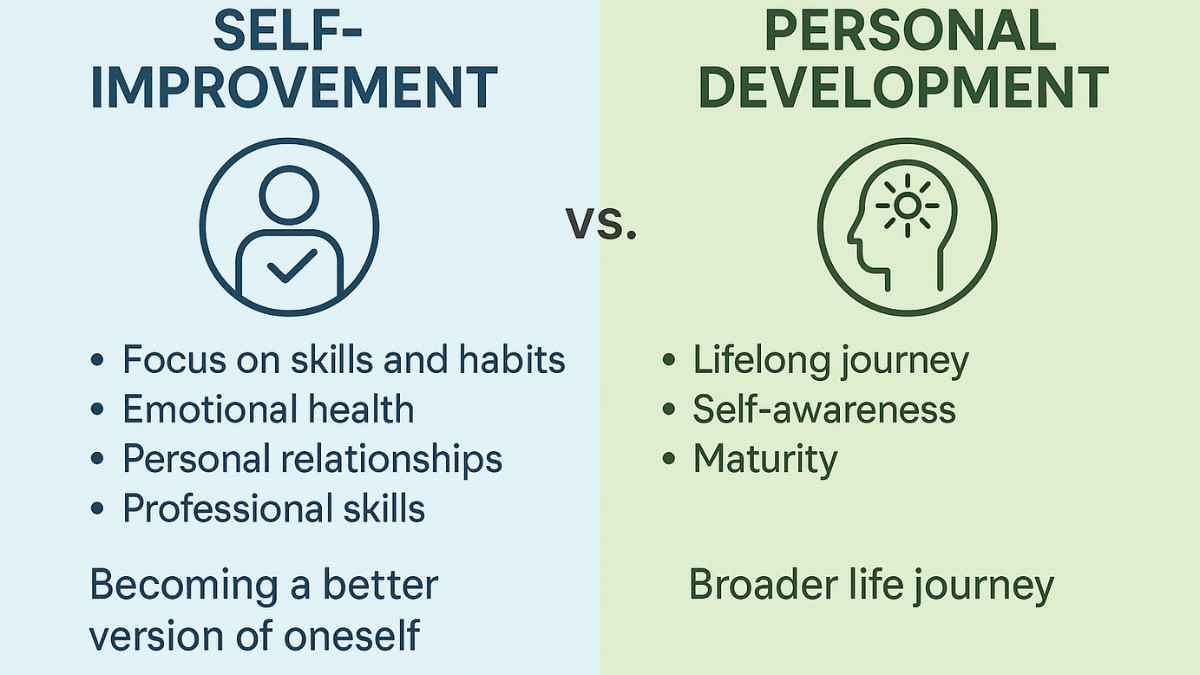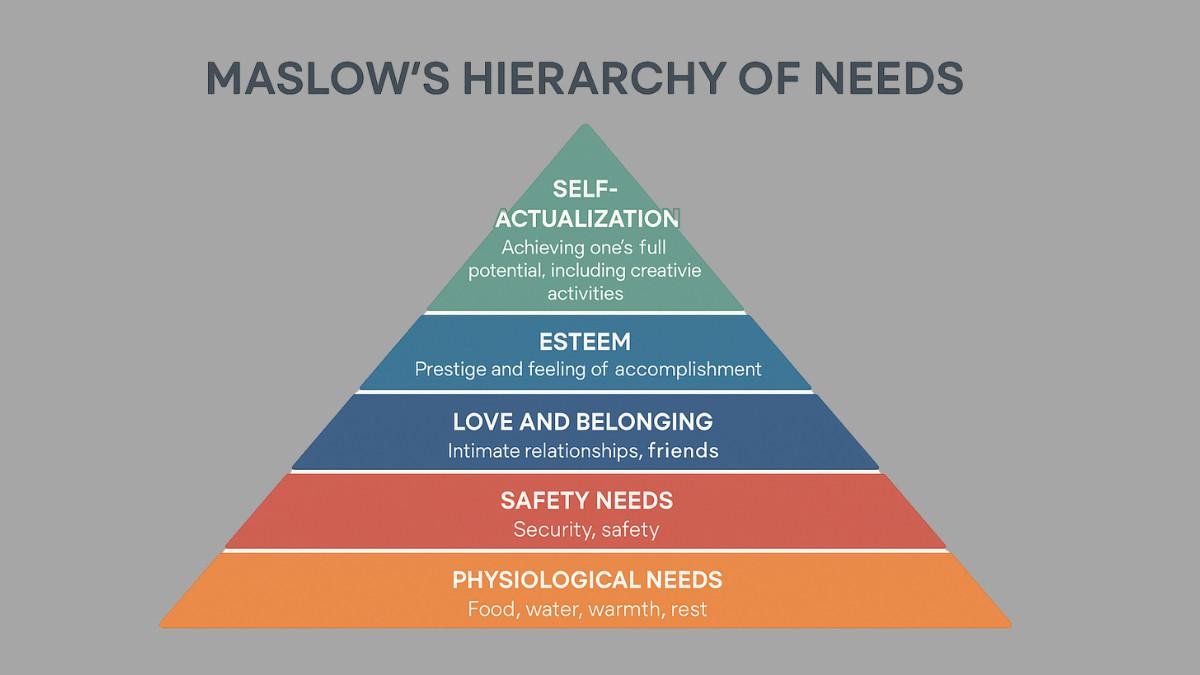Introduction:
Self-improvement and personal development are essential to unlocking our true potential. Cultivating a growth mindset—the belief that abilities can be developed through effort—fuels this journey, turning challenges into opportunities. These practices encourage continual learning, resilience, and positive change in both personal and professional lives. This article explores key concepts like the growth mindset, psychological foundations, practical strategies, and the role of community in fostering lasting growth.
1. Understanding Self-Improvement and Personal Development
1.1 Definitions and Concepts

Self-improvement is the practice of enhancing one’s knowledge, skills, and personal qualities with the aim of becoming a better version of oneself. It often focuses on areas such as emotional health, personal relationships, and professional skills.
Personal development, on the other hand, is a broader concept that encompasses self-improvement but also includes ongoing learning and self-awareness throughout life. It is a lifelong process of self-discovery and personal growth that can involve various aspects like education, social skills, and emotional maturity.
The relationship between these two concepts is quite intertwined; self-improvement serves as a pillar of personal development. As individuals address specific areas of their lives, they often contribute to overall personal growth.
1.2 Historical Perspectives

The idea of self-improvement can be traced back to early human races. Philosophers like Socrates emphasized the importance of self-reflection, while Eastern philosophies like Buddhism offered insights into mindfulness and self-awareness.
Throughout history, various influential thinkers, including Benjamin Franklin and Dale Carnegie, contributed significantly to the self-help movement. Franklin wrote about common-sense advice, and Carnegie wrote about how to connect with others. The evolution of personal development theories shifted from mere self-improvement to more structured approaches, such as Maslow’s Hierarchy of Needs and the more recent concepts of emotional intelligence, showcasing how the understanding of personal growth has broadened over time.
1.3 The Importance of Personal Growth
Working on self-improvement and personal growth has many advantages. It enhances mental health by promoting a sense of purpose and reducing stress.
Personal growth can significantly influence career advancement by helping individuals develop skills that are valuable in the workplace.
Healthy relationships flourish when individuals invest in their personal development, fostering empathy, communication skills, and emotional intelligence.
2. The Psychological Foundations of Self-Improvement
2.1 Motivation: The Driving Force
Motivation falls into two categories: intrinsic (inside-driven) and extrinsic (outside-driven). Intrinsic motivation comes from personal satisfaction, while extrinsic motivation is influenced by external rewards like praise or recognition.
To improve yourself, set clear goals and understand what motivates you internally.
2.2 Mindset and Attitude
The concept of a fixed vs. growth mindset, popularized by psychologist Carol Dweck, plays a significant role in self-improvement. A fixed mindset holds you back—it assumes you can’t improve. But a growth mindset helps you learn by seeing challenges as chances to get better.
Adopting a positive attitude towards learning can transform the way you approach obstacles. Strategies to cultivate a growth mindset might include reframing negative thoughts and celebrating small wins along your journey.
2.3 Self-Awareness and Reflection
Self-awareness means knowing your feelings, actions, and why you do things. It helps you grow because you can see what to work on.
Techniques for self-reflection include mindfulness exercises, journaling, and seeking constructive feedback from trusted friends or mentors. Feedback is invaluable; it can shine a light on blind spots and help validate your progress.
3. Practical Strategies for Personal Development
3.1 Setting Effective Goals
Effective goal-setting is essential for productive growth. Use the SMART method to craft clear and actionable goals:
Specific: Clear and detailed
Measurable: Track your progress
Achievable: Realistic for you
Relevant: Matters to your life
Time-bound: Set a deadline
Differentiate between short-term and long-term goals to maintain focus. Tracking your progress can involve regular check-ins, journaling about your achievements, or using apps designed to track personal growth.
3.2 Building Healthy Habits
Once you understand how habits form, you can use that knowledge to make healthy routines stick—like exercising daily or reading more.
Habits often follow a cycle of cue, routine, and reward.
Strategies for developing healthy habits include starting small, making changes gradually, and creating an environment that supports your new habits. Obstacles to change are common, but identifying them and strategizing around them can lead to lasting improvements.
3.3 The Role of Education and Learning
Lifelong learning is crucial for personal development. It keeps your skills sharp while opening new opportunities. This can be achieved through traditional education, online courses, workshops, or self-directed learning.
Utilizing various resources—books, podcasts, and educational websites—can help you stay informed and engaged in your learning journey.
4. The Influence of Environment and Community
4.1 The Impact of Social Circles
The relationships in your life can significantly impact your personal development journey. Supportive friendships can encourage you to strive for your goals, while toxic relationships may hold you back.
Finding mentors or role models can provide guidance and insight, motivating you further in your growth journey.
4.2 Work and Personal Development
Your workplace culture can greatly influence your path to personal growth. A supportive work environment encourages continuous improvement and professional development.
Team dynamics also play a role; constructive collaboration can enhance personal skills, while competition may spur personal growth in different ways.
4.3 Community Engagement and Support
Joining self-improvement groups provides motivation and accountability. Volunteering not only allows you to give back but also offers an opportunity to learn new skills and connect with like-minded individuals.
Online communities and forums are valuable for sharing experiences, gaining support, and learning from others on similar personal growth journeys.
5. Overcoming Challenges in Self-Improvement
5.1 Dealing with Setbacks
Everyone faces setbacks when trying to improve—it’s normal. Understanding failure as a learning opportunity can foster resilience, allowing you to bounce back stronger.
Strategies for coping with setbacks include reframing your perspective, seeking support from friends, and examining what went wrong to extract valuable lessons.
5.2 Challenging Limiting Beliefs
Identifying and challenging negative beliefs is vital for overcoming mental obstacles. Techniques for reframing your thoughts include practicing positive affirmations and visualizing success.
Embracing a positive mindset can lead to a profound transformation in how you approach challenges.
5.3 Managing Time and Energy
Time management is crucial for ensuring that you can dedicate time to personal growth. Strategies like prioritizing tasks, creating schedules, and avoiding multitasking can enhance productivity.
Equally important is self-care; nurturing your physical and emotional well-being can ensure you have the energy to pursue your goals. Try techniques such as the Pomodoro method (working in intervals with short breaks) to maintain focus and prevent burnout.
Conclusion
Personal growth mindset isn’t about achieving perfection—it’s about consistent progress. Some days will feel effortless, while others may challenge your resolve. But with the application of these principles, you’ll build resilience, clarity, and the life you envision.
Remember that every step, no matter how small, contributes to the bigger picture. So, keep going—your growth is your greatest asset.
FAQs
- Self-improvement works on specific skills (like communication or time management), while personal development covers overall growth in all areas of life.
The best way to keep your motivation high? Set specific goals, check in on your progress, and surround yourself with people who lift you up.
Using the SMART framework can help create clear and actionable goals that guide your growth.
Surround yourself with people who inspire and support you. Spend time with those who are aligned with your goals and values. Seek guidance from mentors, and engage with communities or groups that are also focused on growth and development.
Setbacks and limiting beliefs are common; they can be overcome by reframing your perspective, seeking feedback, and learning from experiences.
Self-improvement and personal development are fueled by:
Motivation (intrinsic drive & extrinsic rewards)
Growth Mindset (embracing challenges & learning)
Clear Goals (SMART objectives & progress tracking)
Healthy Habits (consistent routines & discipline)
Self-Awareness (reflection & feedback)
Lifelong Learning (books, courses, experiences)
Supportive Environment (mentors, community, positive influences)



